At the Aspen Institute Economic Opportunities Program, we believe that confronting the inequities that divide us along the lines of race, gender, ethnicity and geography, restoring the promise of work, and broadening opportunities to participate in business ownership are essential to building a more free, more just, and more equitable world. Below we share our monthly newsletter with highlights of recent work. As always, we welcome your feedback, thoughts, and partnership in advancing inclusive opportunity and an economy in which we all can thrive. Click here to subscribe.
Click here to view past editions of our newsletter
Upcoming Events
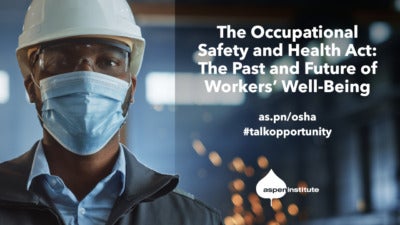
May 4 – The Occupational Safety and Health Act: The Past and Future of Workers’ Well-Being
Signed in 1970, the Occupational Safety and Health Act (OSH) has been a tremendous success in advancing worker protection and workplace safety. But challenges remain, and access to safe workplaces is not shared equitably. How can we build a safer workplace for all workers? Join us for a virtual discussion on The Occupational Safety and Health Act: The Past and Future of Workers’ Well-Being, this Wednesday, May 4 from 2:00-3:15 p.m. EDT. Featured speakers include Magaly Licolli (Venceremos), Dr. David Michaels (The George Washington University School of Public Health), Saket Soni (Resilience Force), Jon Woodsum (Barton Malow Company), and moderator Andrea Hsu (NPR). This is the fourth conversation in our five-part series on the History and Future of U.S. Labor Law.
Tweet I’m excited to #talkopportunity with @MagalyLicolli, @drdavidmichaels, @saket_soni, Jon Woodsum @bartonmalow, and @andrea_c_hsu on occupational safety, health, and workers’ well-being. Join me for this @AspenJobQuality event, May 4 at 2pm ET.
May 26 – A Workers’ Bill of Rights: What We Want and How to Get There
Join us on Thursday, May 26, from 2:00-3:15 p.m. EDT, to discuss what we want work to look like, the policies and labor laws that will help achieve that vision, and the strategies needed to usher in that change. Featured guests include Jaz Brisack (Starbucks Workers United), Don Howard (The James Irvine Foundation), Linda Nguyen (Chief of Staff, United Food and Commercial Workers Local 770), Ai-jen Poo (National Domestic Workers Alliance), and Dorian Warren (Community Change), with opening remarks from Aspen Institute President Dan Porterfield. This is the final conversation in our five-part series on the History and Future of U.S. Labor Law. Registration will open soon. Join our mailing list to receive an invitation.

May 3 – Bankers Roundtable: Diversifying Your Small Business Lending
On Tuesday, May 3, at 12:00 p.m. EDT, Business Ownership Initiative Senior Director Joyce Klein will speak at a Bankers Roundtable: Diversifying Your Small Business Lending, hosted by the Federal Reserve Banks of Kansas City and Dallas, the Federal Deposit Insurance Corporation, and the Office of the Comptroller of the Currency. The event will cover findings from the Small Business Credit Survey and explore opportunities to leverage national and statewide resources and support small businesses.
Listening to Workers and Small Businesses: New Tools for Workforce Organizations
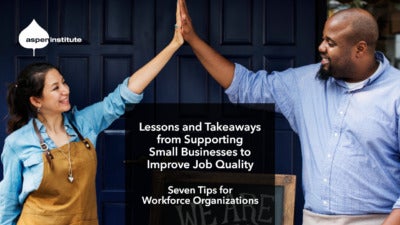
Lessons and Takeaways from Supporting Small Businesses to Improve Job Quality: Seven Tips for Workforce Organizations
This guide contains tips and practices for workforce organizations to create trusted relationships with small businesses focused on improving job quality. It includes seven lessons for prospecting, recruitment, and ongoing engagement. The takeaways outlined in this tool are based on our experience working with Pacific Community Ventures and workforce partners across the country to conduct job quality-focused business advising pilots with small businesses.
Tweet #Workforce organizations face a growing demand for practices that connect people to good jobs. This guide by @AspenJobQuality contains tips and practices for creating trusted relationships with #smallbiz employers focused on #jobquality.
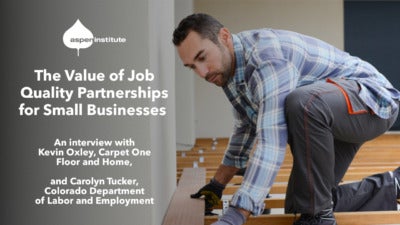
The Value of Job Quality Partnerships for Small Businesses
Last year, we launched a pilot pairing small businesses recruited by the Colorado Department of Labor and Employment (CDLE) with good jobs advisors from Pacific Community Ventures. In this interview, we speak with Kevin Oxley, owner of Carpet One Floor and Home, and CDLE Regional Business Coordinator Carolyn Tucker to understand how this unique partnership improved job quality.
Tweet In this interview, @yooriechang of @AspenJobQuality sits down with Kevin Oxley @CarpetOne and CarolynTucker @ColoradoLabor. Hear how their partnership improved business performance and #jobquality — and lessons for employers across the country.
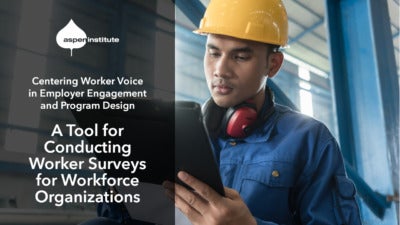
Centering Worker Voice in Employer Engagement and Program Design: A Tool for Conducting Worker Surveys for Workforce Organizations
Originally released in beta form last year, this tool is intended to help workforce development professionals partner with local businesses to gather input about frontline workers’ experience. It provides an example set of survey questions that leaders can adapt based on the interests and needs of a business and its workforce. This guide is based on practices we developed over years of conducting applied research and is informed by a careful review of several employee surveys, as well as a recent set of pilot partnerships with workforce organizations across the country.
Tweet #Workforce organizations can unlock worker expertise in ways that strengthen safety, #jobquality, #equity, and the business bottom line. @AspenJobQuality developed a survey tool to help achieve that.
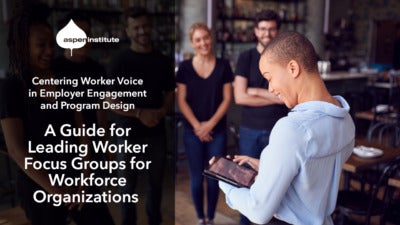
Centering Worker Voice in Employer Engagement and Program Design: A Guide for Leading Worker Focus Groups for Workforce Organizations
Originally released in beta form last year, this guide is intended to help workforce development professionals partner with local businesses to conduct applied research with frontline workers. Although there are many ways to gather worker input, this publication examines semi-structured focus groups, based on practices we developed over years of applied research. This guide is particularly informed by job quality partnerships implemented in Arizona, California, and Colorado.
Tweet Frontline workers play a critical role in keeping businesses running and communities safe. This guide by @AspenJobQuality can help #workforce organizations turn insights into action.
News and Updates
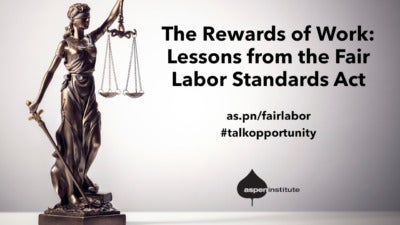
The Rewards of Work: Lessons from the Fair Labor Standards Act
The Fair Labor Standards Act of 1938 improved job quality for hundreds of thousands of workers. But it excluded many from the start, and its impact has diminished over time. How can we create a more just economy that rewards work fairly? On April 7, we hosted a discussion on The Rewards of Work: Lessons from the Fair Labor Standards Act, the second event in our five-part series on the History and Future of U.S. Labor Law. Featured speakers include Rebecca Dixon (National Employment Law Project), Michael Lastoria (&pizza), Teresa Romero (United Farm Workers), Ben Zipperer (Economic Policy Institute), and Noam Scheiber (The New York Times). We are pleased to share a recording of our conversation — including video, audio, and written transcript — as well as a blog post recapping key takeaways and highlights from the conversation.
Tweet The FLSA established the minimum wage, overtime pay, standard work week, and safety provisions for young workers. But it excluded many, and its impact has diminished. What can we learn from this history?
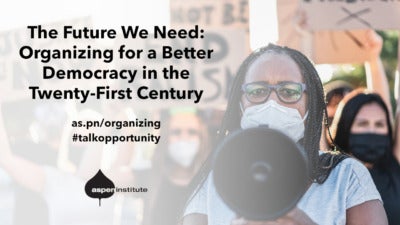
The Future We Need: Organizing for a Better Democracy in the Twenty-First Century
The US is at a crossroads. We face threats to democracy, an ongoing battle against discrimination and hate, and the simmering resentment of growing numbers of people who work hard but find a middle class life out of reach. Now, workers, communities, and businesses are all organizing for change. In their new book, The Future We Need: Organizing for a Better Democracy in the Twenty-First Century, authors Erica Smiley (Jobs With Justice) and Sarita Gupta (Ford Foundation) argue that collective bargaining can improve work, address discrimination, and enhance the health of our democracy. On April 19, we hosted a book talk featuring Smiley, Gupta, and moderator Rick Wartzman (KH Moon Center for a Functioning Society). We are pleased to share a recording of our conversation, including video, audio, and written transcript.
Tweet Hear @AspenBizSociety and @AspenJobQuality #talkopportunity with @saritasgupta, @SmileyJWJ, and @RWartzman. This virtual book talk explores how collective action can help to build a healthy, multiracial democracy with an economy that works for all.
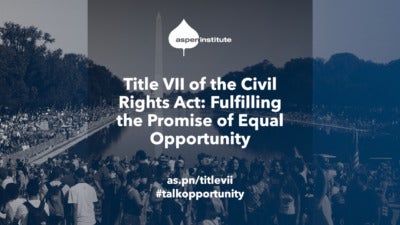
Title VII of the Civil Rights Act: Fulfilling the Promise of Equal Opportunity
While the American workforce is more diverse than it was 60 years ago, the goal of equal opportunity has not been realized. As we continue on the long march toward equality, what can we learn from history? On April 27, we hosted a discussion on Title VII of the Civil Rights Act: Fulfilling the Promise of Equal Opportunity, the third event in our five-part series on the History and Future of U.S. Labor Law. Featured speakers include Robert Barea (Prudential Financial, Inc.), Olatunde Johnson (Columbia Law School), Thomas Saenz (MALDEF), Tanya Wallace-Gobern (National Black Worker Center) and moderator Mekaelia Davis (Surdna Foundation). We are pleased to share a recording of our conversation, including video, audio, and written transcript.
Tweet Despite bans on employment discrimination, wage gaps persist, harassment continues, and frontline workers look very different than the boardroom. As we march on toward equality, what lessons can we draw from history?

When Climate Change Meets a Bad Work Environment, Disaster Can Strike
This year the US continues to endure above-average temperatures, persistent drought, and severe hurricanes — conditions that are especially hard for people who work outdoors and in facilities that do not offer protection from the elements. These workers face two of the greatest challenges of this century: the harsh realities of climate change combined with steadily worsening job conditions. In a new post on the Aspen Institute blog, Future of Work Initiative Director Shelly Steward and David Gibson outline the scope of the challenge and the need to build a sustainable and equitable future.
Tweet #JobQuality has been eroding for decades, and climate change will make conditions even worse. How can we protect workers on the job, now and in the future? @shellysteward and @davidkgibson share insights on the @AspenInstitute blog.

Climate Infrastructure Investments Should Also Boost Job Quality and Equity
The Infrastructure Investment and Jobs Act is a major accomplishment that addresses a backlog of needed repairs while also making essential investments toward a more climate-resilient future. We should leverage this opportunity to ensure that the more than 700,000 jobs created will also be good jobs. In a new post on the Aspen Institute blog, Good Companies/Good Jobs Initiative Director Mark Popovich breaks down the law’s investments and highlights key areas where we can (and should) center job quality and equity.
Tweet As we kick off investments from the new Infrastructure Investment and Jobs Act, how can we leverage this opportunity to promote #jobquality, equity, and sustainability? @mpopov1229 shares insights on the @AspenInstitute blog.

Updates from UpSkill America
This month, we said a heartfelt goodbye to our esteemed colleague Jaime Fall. Jaime has served as director of our UpSkill America initiative since 2015 and recently accepted a position as workforce and economic strategies director for the Economic Development Collaborative in Ventura County, California. Jaime will continue working with EOP part time as we search for a permanent Associate Director for UpSkill America. No one can fill Jaime’s shoes, but if you know someone who’s eager to take up the UpSkill America mantle, please encourage them to apply.
In other upskilling news, Lowe’s announced a new free education programs for employees, and we recently profiled McDonald’s in our Digital Skills Spotlight. We interviewed Bethany Tate Cornell, senior vice president and chief learning and development officer, to learn how McDonald’s leverages technology to employer learners at all levels. Read more.
Tweet The team at @upskillamerica ?? is looking for an Associate Director! If you know someone who is committed to expanding opportunity and advancing the #upskilling movement, encourage them to apply.

Building Job Quality in the Workforce Development System
EOP Executive Director Maureen Conway spoke at a panel on “Building Job Quality in the Workforce Development System” at the National Association of Workforce Boards 2022 Forum. The session explored the role that Workforce Development Boards can play in helping jobseekers move into jobs with family-supporting wages that become great career opportunities. Conway spoke alongside Kim Vitelli, administrator of the U.S. Department of Labor’s Office of Workforce Investment, and Peter Callstrom, president and CEO of the San Diego Workforce Partnership, who is also a newly minted Job Quality Fellow. We will share a recording of the conversation if one becomes available.
New Faces – and New Roles – at EOP
EOP is growing! We’re pleased to welcome three new faces to our team, and announce some well earned promotions. All EOP staff are available for speaking and media engagements. Learn about our team and contact us for information.

Anmol Chaddha
Anmol Chaddha recently joined EOP as a fellow with our Future of Work Initiative. He is also principal on the Reimagining Capitalism team at Omidyar Network, where he focuses on increasing the power of working people. Before joining Omidyar Network, Anmol led the Equitable Futures Lab at the Institute for the Future in Palo Alto, California. He managed the California Future of Work Commission created by Governor Gavin Newsom to develop a broad agenda to promote economic equity in the state. Anmol has extensive experience in policy and social science research, including economic inequality, racial inequality, low-wage work, job quality, debt, and wealth. Learn more about Anmol.

Matt Helmer
This month we welcomed (back) Matt Helmer as one of EOP’s two new associate directors. Matt’s work focuses on developing conversations, tools, and research that advance job quality, equity, and economic security for workers with low and moderate incomes. He worked for our Workforce Strategies Initiative (WSI) from 2009 to 2014. With WSI, Matt researched community college and nonprofit partnerships and construction pre-apprenticeship and apprenticeship programs, facilitated the Sector Skills Academy, and supported the Reinventing Low-Wage Work and Working in America discussion series. Learn more about Matt.

Dee Wallace
This month, longtime friend and consultant Dee Wallace joined EOP as a senior fellow. As a workforce development practitioner and trainer, Dee has designed and facilitated workshops, conferences, and practicums on topics such as employment strategies for people with criminal records, retention and advancement, employer engagement, and program financing strategies. She currently serves as faculty for our Workforce Leadership Academies in New Orleans, Hartford, Detroit, Baltimore, Jackson, and other cities. Learn more about Dee.

Joyce Klein
Joyce Klein, our longstanding director of the Business Ownership Initiative is now senior director of BOI. Joyce brings deep expertise to the work of expanding opportunities to participate in business ownership for marginalized entrepreneurs, particularly women and entrepreneurs of color. Joyce has extensive relationships throughout the field of community development finance, as well as with policymakers, scholars, and leaders at the Small Business Administration and at the Department of Treasury, and her work has been a credit to the Aspen Institute for many years. Learn more about Joyce.

Mohona Siddique
Mohona Siddique joined the EOP team last summer and quickly showed her strategic thinking prowess and ability to take on significantly more management responsibilities. She is now associate director with EOP, and will be playing a leadership role in our four-year demonstration and learning project focused on the role financial intermediaries can play in encouraging improved job quality among small businesses, and in particular how job quality improvements can improve opportunities for Black, Indigenous, Latino, and other workers of color. Learn more about Mohona.
Join the conversation
Follow EOP on social media to join the conversation!
-Job quality updates from EOP @AspenJobQuality
-Business Ownership Initiative @Aspen_BOI
-UpSkill America @upskillamerica
-Future of Work Initiative @AspenFutureWork
About EOP
The Aspen Institute Economic Opportunities Program (EOP) advances strategies, policies, and ideas to help low- and moderate-income people thrive in a changing economy. We recognize that race, gender, and place intersect with and intensify the challenge of economic inequality and we address these dynamics by advancing an inclusive vision of economic justice. For over 25 years, EOP has focused on expanding individuals’ opportunities to connect to quality work, start businesses, and build economic stability that provides the freedom to pursue opportunity. For more information, visit as.pn/eop.
EOP has several initiatives, including the Business Ownership Initiative, Workforce Strategies Initiative, UpSkill America, Good Companies/Good Jobs, and the Future of Work Initiative. In addition, across these approaches EOP hosts the Economic Opportunity Fellows Network and the Opportunity in America event series.
Thank you to our many partners and funders for supporting our efforts.
Support Our Work
We are committed to making our events and publications freely available to everyone who finds them useful. But if you find value in our work and are able to support it, please consider making a tax-deductible donation. Click here to learn more.
Keep in Touch
Click here to join our mailing list. For updates every day, follow us on social media.

